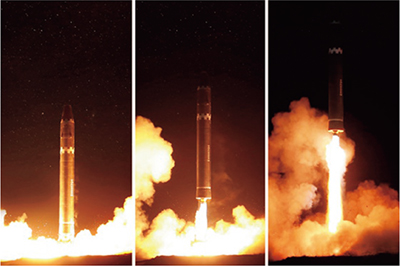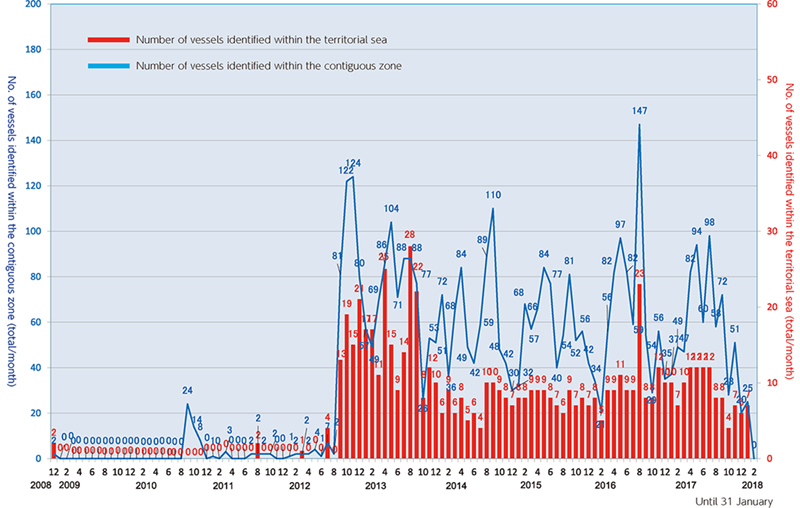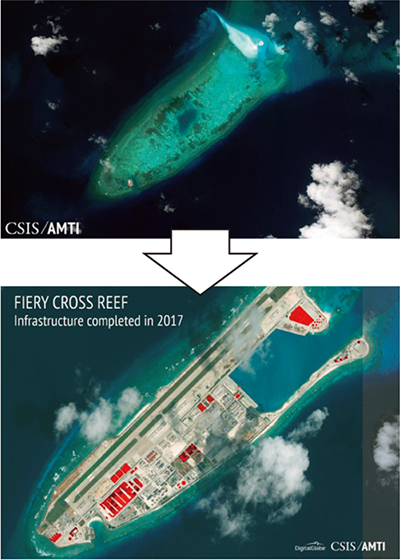Diplomatic Bluebook 2018
Chapter 3
Japan's Foreign Policy to Promote National and Global Interests
1 National Security Initiatives
(1) “Proactive Contribution to Peace” Based on the Principle of International Cooperation
It is no exaggeration to state that the security environment surrounding Japan has become the most severe since the end of World War Ⅱ. North Korea has continuously taken provocative actions, disregarding the strong will of the international community towards peaceful solution. Since 2016, North Korea has conducted three nuclear tests, and launched as many as 40 ballistic missiles, including ballistic missiles that flew over Japan on two consecutive occasions, constituting an unprecedented, grave and imminent threat. China has been strengthening its military power extensively and rapidly in a way that lacks transparency as it has not provided any detailed breakdown of its national defense budgets despite the increase of the expenditures by approximately 49 times over the past 29 years only according to its public announcement. China has also continued with its unilateral attempts to change the status quo by force or coercion at sea and in the airspace in the East and South China Seas, based on its own claims, which are inconsistent with the existing international order. Furthermore, there are diversifying global security challenges, including the proliferation of weapons of mass destruction, the growing threat of terrorism, and emerging issues in new domains such as cyberspace and outer space. In such a security environment, any threats, wherever in the world they occur, could directly affect the security of Japan, and no nation can any longer maintain its own security alone.
 A ballistic missile with an intercontinental ballistic missile range, launched by North Korea on November 29, 2017
A ballistic missile with an intercontinental ballistic missile range, launched by North Korea on November 29, 2017 Number of Chinese Government-owned vessels that entered the contiguous zone or intruded into territorial sea surrounding the Senkaku Islands (Source: Japan Coast Guard website)
Number of Chinese Government-owned vessels that entered the contiguous zone or intruded into territorial sea surrounding the Senkaku Islands (Source: Japan Coast Guard website)Since the end of World War II, Japan has consistently followed the path of a peace-loving nation under the Constitution of Japan, and has proactively contributed to the peace and prosperity of the international community through cooperation with the international community as well as other international organizations, including the United Nations. Japan's such posture has garnered appreciation and respect from the international community. The international community expects Japan to play a more proactive role for the peace and security in the world in a way commensurate with its national capabilities.
Continuing to adhere to the course that it has taken to date as a peace-loving nation, Japan will advance vibrant diplomacy under the policy of “Proactive Contribution to Peace” based on the principle of international cooperation, and will contribute even more proactively to the peace and security of the international community.
 Undergoing reclamation and militarization at the Fiery Cross Reef on the South China Sea
Undergoing reclamation and militarization at the Fiery Cross Reef on the South China SeaTop: August 14, 2014
Bottom: November 19, 2017 (Section in red: Outpost developed in 2017)
(2) Enforcement of the “Legislation for Peace and Security,” and Initiatives Based on the Legislation
In order to adapt to the changes in the security environment surrounding Japan and to secure the lives and peaceful livelihood of its people, it is important to advance vibrant diplomacy to create a stable and predictable international environment. In addition, it is important to enable seamless responses to any situations, and to contribute even more proactively to the peace and stability of the international community under the policy of “Proactive Contribution to Peace” based on the principle of international cooperation. To achieve these objectives, the “Legislation for Peace and Security” took effect in March 2016.
This legislation aims to solidify Japan's orientation as a peace-loving nation, including adherence to its exclusively defense-oriented policy. Moreover, the legislation strengthens the Japan-U.S. Alliance and enhances the deterrence capability of Japan, thus enables Japan to prevent conflicts beforehand, and to further contribute to the international community. Given that the scope of supplies and services that the Self-Defence Forces (SDF) can provide for forces of other countries has been expanded under the “Legislation for Peace and Security,” new Acquisition and Cross-Servicing Agreements (ACSA) with the U.S. (April) and Australia (September) entered into force, and an ACSA with the UK (August) also entered into force. In addition, Japan also reached a substantial agreement with Canada on ACSA negotiations, and arrived at a broad agreement with France.
Japan has taken advantage of a variety of opportunities to thoroughly explain the “Legislation for Peace and Security” to foreign countries. Not only the U.S. but also a number of countries and organizations including Australia, ASEAN Member States, European countries, Central and South American countries, and the UN have expressed their understanding and support for this legislation. This clearly demonstrates that the “Legislation for Peace and Security” is legislation that contributes to the peace and security of the world.
(3) Territorial Integrity
Maintaining territorial integrity is a fundamental responsibility of the Government. Japan's policy to resolutely protect its land, sea and airspace remains unchanged. Japan will continue to maintain its stance of responding firmly but in a calm manner. The relevant Government agencies are working in close cooperation to advance measures to ensure a seamless and adequate response to any form of unlawful acts. At the same time, the Government of Japan engages in proactive efforts to promote awareness of Japan's position on territorial integrity among the international community, making use of the contacts and knowledge of our diplomatic missions overseas.
